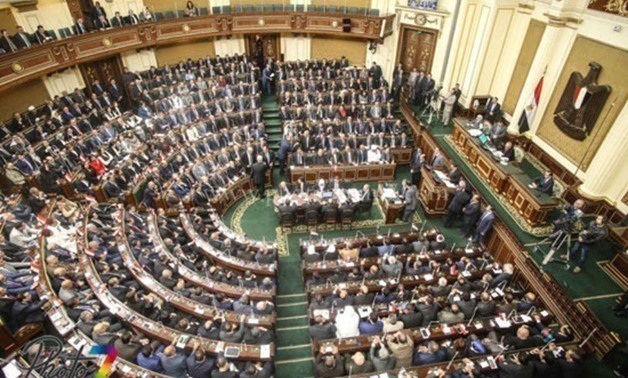
FILE - Egyptian Parliament
CAIRO – 15 September 2018: The Egyptian Parliament held Saturday the Arab Parliamentary Conference of the Inter-Parliamentary Union under the title "On the Current Arab Situation" in the presence of representatives from Arab national parliaments, while Qatari representatives were absent.
The conference was attended by representatives of several Arab countries such as Yemen, Jordan, Kuwait, UAE, Bahrain, Morocco, Algeria, Palestine, Somalia and Sudan.
The opening speech was delivered by the representative of the Arab Parliamentary Union in addition to speeches by a number of member parliaments and public figures including the chairman of Alexandria library Mostafa El-Faki.
The conference sessions tackled the Arab political system and external threats as well as internal challenges, economic problems and combating terrorism through education, culture and the rule of law.
During the first session, Faki said that Egypt has always been supporting the Arab causes and targeted for its role in bolstering the stability of the region and its support for Arab causes.
Egypt is the cornerstone of the Arab region, he stressed; adding that it has good relations with the Gulf countries and adopts a noble stance on the Syrian crisis.
He pointed out that Egypt managed to uproot up to 70-80 percent of terrorism in Sinai, adding that the war against terrorism cost Egypt large sacrifices.
Qatar’s relations with several Arab states have been strained since May 24, 2017 over a leaked statement attributed to Qatari Emir Sheikh Tamim bin Hamad, criticizing Gulf foreign policy with Iran, describing it as “unwise”.
On June 5, 2017, Qatar was hit by its biggest diplomatic crisis after multiple Arab nations, including Egypt, Saudi Arabia, the UAE and Bahrain cut ties with Qatar, accusing it of destabilizing the region with its support for Islamist groups.
The Arab quartet halted all land, air and sea traffic with Qatar, and withdrew their diplomats and ambassadors from the Qatari peninsula. The Arab quartet issued 13 demands to Doha – then shortened them to six principles - including closing Al Jazeera television, curbing relations with Iran and shutting down a Turkish military base.
The four Arab countries severed relations with Doha over what they say was its close links to Iran, which has been accused of interfering in Arab countries’ affairs and being behind terrorist plots. Doha restored full diplomatic relations with Tehran amid the crisis.
One major disagreement between Qatar and its neighbors has been the former’s support for the Muslim Brotherhood, which has been outlawed as a terrorist group by the boycotting countries.
Since the eruption of the crisis, Qatar showed no intention of solving the strife. However, Qatar placed several people and entities on its terrorism list in March, including several Qatari nationals already blacklisted by the Arab quartet that accused Doha of supporting militants. Qatar’s issuance of a terror list of 19 individuals and eight entities has done little to impress decision-makers in the four Arab countries.

Comments
Leave a Comment